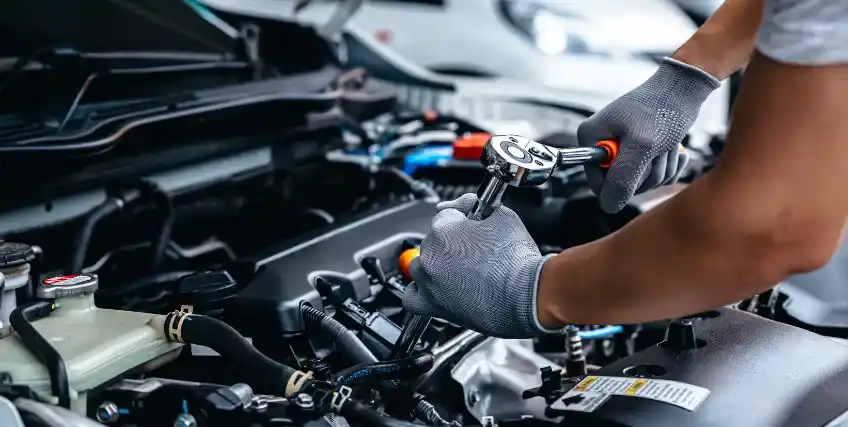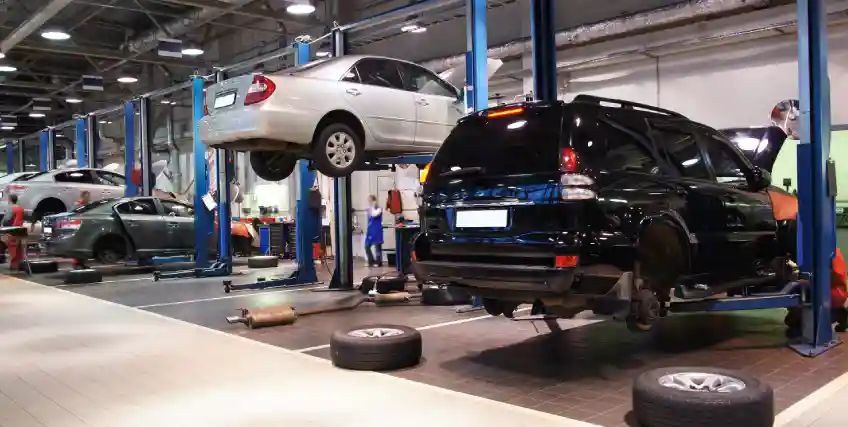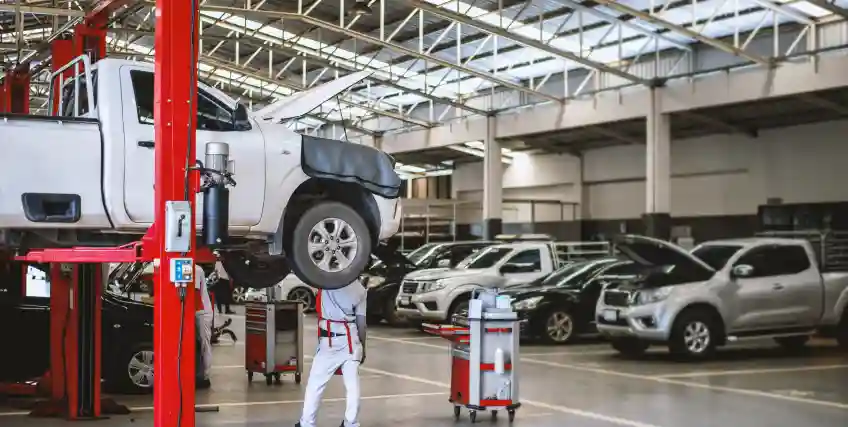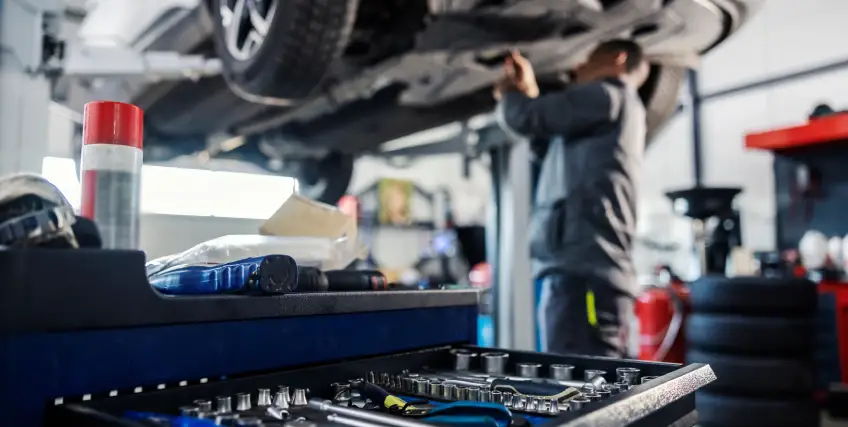Fuel Your Growth
With Easy Loans for Auto Repair Shops
Looking for Business Financing?
Apply now for flexible business financing. Biz2Credit offers term loans, revenue-based financing, lines of credit, and commercial real estate loans to qualified businesses.
Set up a Biz2Credit account and apply for business financing
One of the few business that face high operating expenses and uneven revenue cycles is the business of auto repairing. From rising prices of spare parts to payroll obligations,
the constant financial demand can be taxing. On top of that, there are delayed invoices, slow seasons, and even equipment failures that can stretch out the available cash. And most businesses in this sector rarely rely on walk-ins alone.
Given that there are so many hiccups in scaling an auto repair shop, financing can be of great help. That's why loans for auto repair shops have become a practical instrument for overseeing operations. Funding from these loans can help entrepreneurs cover gaps in working capital and business owners can use the capital to invest in machinery, expansion or simply survive when expenses become more than income. The right funding ensures your shop doesn’t slow down when costs speed up.
For many owners, having access to auto repair shop financing means being able to make payroll on time, order parts in bulk, or take on larger repair contracts. It removes the uncertainty of day-to-day liquidity and allows for better long-term planning.
A small business loan for an auto repair shop can stabilize cash flow, smooth out seasonal dips, and prepare you for growth. Whether you’re upgrading tools or managing backlogs, timely funding is what keeps your business in gear.
Costs of Running an Auto Repair Shop in the U.S.
Owning an auto repair shop isn’t cheap. Between the tools, tech, people, and rent, overhead can pile up fast, even if business is steady.
Let’s break it down. On average, an auto repair shop needs a substantial investment, around upwards of $100,000 to cover just the initial expenses of a regular repair shop. This expense also includes labor charges, which is one of the biggest drivers, with certified mechanics earning $47,000 to $62,310 per year depending on location and specialization.
Then there’s equipment. A good hydraulic lift can cost anywhere between $5,000 and $25,000. Diagnostic tools run upwards of $10,000. Even basic hand tools, if you’re fully outfitting a new bay, can hit $10,000 easily.
Don’t forget rent and utilities. In urban areas, monthly rent can cross $4,000, not including insurance, waste disposal, and certifications.
If your shop offers warranties or flexible payment plans, you’re likely holding off on collecting full repair costs upfront, creating a cash crunch.
That’s why many shop owners lean on auto repair shop financing. Whether it’s a short-term loan for inventory or a longer-term loan for expanding your space, access to funding helps cover the real costs of staying in business.
Popular Financing Options for Auto Repair Businesses
Every single auto repair shop has its own unique purpose of securing a loan. Some might need a lump sum for a new lift while others might be looking for flexible financing to cover daily expenses. That's why it is important to understand the different financing options and asses which one suits your goals the best.
Term Loans
A term loan is perhaps one of the most popular business financing options for auto repair shop owners. With this funding solution, applicants receive a set loan amount and the repayment period is fixed with set monthly payments. This option works well for large one-time investments, business expansion or even installing heavy machinery.
These loans come in both short and long term duration. The interest rates are generally lower for qualified borrowers with strong credit. Do note that a solid credit check, financials, and business history are essential to qualify. You’ll also want to factor in origination fees and repayment timelines.
Business Line of Credit
Need flexibility? A business line of credit gives you access to a pool of funds you can tap into whenever needed. It’s great for covering gaps in cash flow, parts inventory, or sudden repair costs.
You only pay interest on what you use, making this a smart option for auto repair shops that don’t always know what next month will bring. Most lines of credit require a moderate credit score, but approvals are usually faster than traditional loans.
Equipment Financing
Diagnostic tools, air compressors, wheel balancers – everything in your shop costs money. With equipment financing, the machinery acts as collateral. That may mean easier approval, even with a less-than-perfect credit report.
This type of auto repair loan is structured, so you pay for the gear while it earns you money. Since it’s asset-backed, you might also score lower interest rates than unsecured loans.
SBA Loans
If you qualify, SBA loans – like the 7(a) or 504 – offer longer repayment terms and some of the best rates available. They’re government-backed and great for major expansions, renovations, or buying commercial property.
However, expect a longer application process and stricter eligibility criteria. Solid revenue, strong credit history, and a detailed business plan are usually required.
Merchant Cash Advance (MCA)
An MCA provides fast funding, but at a cost. Repayment is based on future sales, which means payments fluctuate with your shop’s income. It’s not a loan, technically, so even businesses with bad credit may qualify.
But be careful; MCAs come with high interest and can drain daily cash flow.
How to Choose the Right Financing Partner for Your Shop
From the speed of the funding decision to interest rates, where you get your loan can impact everything. Not all lenders work the same way, and not every shop has the luxury of waiting weeks for funding. Here's a breakdown of the most common financial institutions and their pros and cons.
1. Traditional Banks
If you are looking for fixed rates, longer duration for repayment and high loan amount, then maybe you should consider financing from traditional banks. But do remember, traditional banks do require excellent credit, steady revenue and considerable long time for approval.
2. Credit Unions
Credit unions are member-focused and may offer more competitive loan terms than big banks. They’re also more likely to work with local or community-based shops.
Still, many credit unions have strict membership requirements and fewer digital tools for fast funding. If you value a relationship-driven approach and meet their criteria, they’re worth exploring.
3. Online Lenders
When speed is everything, online lenders are often the first stop. These platforms tend to process loan applications quickly, sometimes in under 24 hours. They’re also more lenient toward shops with bad credit or newer businesses.
That flexibility comes at a price, which may mean higher interest rates and shorter repayment windows. Also, read the fine print: some charge steep origination fees or daily payments.
4. SBA-Approved Lenders
For long-term projects like buying property or expanding locations, SBA-backed loans through approved lenders can be a great fit. They offer low annual percentage rates and flexible loan terms. These are ideal for well-documented auto repair shops.
But qualifying isn’t easy. You’ll need a solid financial profile, business plan, and the patience to navigate a complex application process.
5. Alternative Options
Title loans and business credit cards offer quick access to cash but carry serious risks. Title loans put your assets on the line. Business credit cards can balloon if you’re only making minimum payments.
They might help in the short-term pinch, but the long-term cost can outweigh the benefits.
| Loan Source | Speed | Credit Flexibility | Interest Rate* | Best For |
|---|---|---|---|---|
| Banks | Low | Low | Low | Established shops |
| Credit Unions | Medium | Medium | Low to Medium | Community-based borrowers |
| Online Lenders | High | High | Medium to High | Fast approvals |
| SBA Lenders | Low | Low | Very Low | Large projects, expansions |
| Title Loans/Credit Cards | Very High | High | Very High | Emergency short-term funding |
* Please note that interest rates may vary depending on a case-to-case basis.
What You Can Finance with Auto Repair Shop Loans
Loans for auto repair shops aren’t just for emergencies. They can support day-to-day operations, prep you for peak season, or even fund long-term growth. Here are the most common ways business owners put that capital to work.
1. Garage Renovation or Expansion
Upgrading your workspace is one of the most common reasons shop owners seek financing. Whether you’re adding more bays, improving the customer lounge, or updating the waiting area, renovations can cost thousands. A small business loan for an auto repair shop helps you cover the upfront costs while preserving your cash flow.
2. Hiring and Payroll
Finding and keeping skilled mechanics isn’t cheap. During busy periods, payroll can become a cash crunch, especially if invoices are still pending. Auto repair shop financing helps you stay current on wages, so your staff doesn’t have to wait.
3. Tooling and Machinery Upgrades
From tire balancers to high-end diagnostic tools, your equipment defines your shop’s capability. These tools can cost $5,000–$10,000 or more. Equipment upgrades often require lump sums, and a short- or medium-term auto shop loan can make this manageable.
4. Software and Management Systems
Running a shop isn’t just about torque wrenches; it’s also about inventory systems, CRMs, and appointment scheduling. Modernizing your back office with software can improve efficiency and customer experience.
5. Parts and Inventory
Having key parts on hand reduces turnaround time and improves customer satisfaction. But ordering in bulk ties up capital. A loan for auto repair shops can help finance parts inventory, so you’re never caught short.
6. Emergency Repair Costs
There will always come a time when you would need emergency cash to cover sudden machinery breakdown. From lifts to AC units to compressors, unplanned breakdowns can bring your business to a halt. If you have an easy access to funding, then urgent or sudden repairs won't be a headache and you can avoid losing revenue too.
What Lenders Look For
Like with any other business financing solution, lenders want to whether you business is stable, profitable and if you will be able to make timely repayment. Keep in mind that each lender has their own checklist. But there are a few aspects that are common and here are some of them:
The first thing that almost every lender check is your credit score. A higher score shows that you manage debt well, pay bills on time, and don’t overextend. If you’re applying for larger amounts or long-term funding, expect a hard credit check and a detailed review of your credit report.
After credit score comes your business’s financials. Keep your monthly revenue and profit margin documents ready. Don't hesitate to show how consistent your cash flow is. It might give you an edge in your application. For most lenders, it is a matter of concern if there are gaps between invoices and payment, unless you show solid bank balances or payment plans in place.
Your business experience might give you a slight edge in your application. If you’ve been running your shop for a few years with steady growth, you’re in a stronger position than a brand-new business. That said, newer businesses or startups can still qualify, especially with a strong business plan and a good credit history.
Don't forget that there are other details that also have a role to play, such as existing debts, number of employees, and business licenses. Lenders want to know if your auto repair business is real, legal, and likely to succeed.
Finally, be ready to discuss what you plan to do with the money. Whether it's buying equipment or hiring staff, a clear use case strengthens your loan application.
How to Apply for Auto Repair Shop Loans
Applying for a loan doesn’t have to be complicated, especially if you go in prepared. Whether you’re seeking funds to expand, cover repair costs, or upgrade equipment, a solid application improves your chances of getting approved.
1. Know Your Numbers
Start by reviewing your shop’s revenue, expenses, and existing debts. Lenders will ask for this information to assess your ability to repay. Check your credit score too. Many lenders have a minimum score requirement, even for short-term loans.
2. Decide How Much You Need
Figure out the loan amount you actually need. Borrowing more than necessary could raise your monthly payments or make repayment harder. If you're unsure, factor in equipment costs, inventory, or seasonal payroll needs.
3. Compare Loan Options
Not all financing options are created equal. A term loan might work well for renovations, while a line of credit is better for recurring needs. Consider the repayment terms, interest rates, and fees associated with each type of loan.
4. Gather Required Documents
You’ll need bank statements, tax returns, profit-and-loss reports, and a valid business license. Having everything upfront speeds up the application process and shows lenders you’re organized.
5. Submit Your Application
Once ready, apply to the lender of your choice. Some may offer prequalification, a soft check that doesn’t impact your score. Others may require a full credit check before making a decision.
Applying for loans for auto repair shops is much easier when you plan ahead. Stay ready, and your funding could be closer than you think.
Trusted by Thousands of Small Business Owners in America.**
Simply because we get what you go through to build a business you believe in.
**Disclaimer: All stories are real, as told by real business owners. Customers do not receive monetary compensation for telling their stories.
From One Entrepreneur to Another: We Get You
We understand what's behind building a business you believe in.
All stories are real, as told by real business owners. Customers do not receive monetary compensation for telling their stories.



Articles on Loans for Auto Repair Shops
Auto Repair Shop Financing: Solutions for Cash Flow Challenges
Running an auto repair shop in the U.S. is no easy feat. The cost of equipment, inventory for car repairs
5 Popular Financing Solutions for Growing Your Auto Repair Business
For auto repair shop owners, cash flow is one of the most important metrics that keeps the business running smoothly. Between surprise vehicle repairs, rising costs
Loans for Auto Repair Shops How to Finance Equipment, Inventory, and Expansion
How does it feel to run an auto repair shop? It’s like fixing a car that’s always in motion. One day it’s the lift breaking down. The next, it’s a sudden need
How to Get a Business Loan to Start an Auto Repair Shop
Crafty mechanics may feel the urge to become business owners by starting their own auto repair shop. But while it’s one thing to be a great technical mechanic
Frequently Asked Questions on Loans for Auto Repair Shops
1. What are the most common types of loans for auto repair shops?
Common loans for auto repair shops include term loans, equipment financing, business lines of credit, and SBA loans. Each option suits different needs like buying tools, covering payroll, or expanding space. Choose based on your shop’s size, cash flow, and credit profile.
2. Can I qualify for an auto repair loan with bad credit?
Some lenders offer auto repair shop financing even with bad credit. However, expect higher interest rates and shorter repayment terms. Improving your credit score before applying can open better options.
3. Are there auto repair loans without collateral?
Some small business loans for auto repair shop owners are unsecured. However, unsecured loans often come with higher interest rates and stricter credit requirements.
4. Can I use the loan for both equipment and payroll?
Many loans for auto repair shops offer flexible use - whether it’s for tooling, parts inventory, or hiring skilled mechanics. Just be clear about your needs when applying.
5. Is refinancing available for existing auto repair shop loans?
You can refinance to lower your interest rate or extend repayment terms. It’s common for business owners looking to reduce monthly payments or consolidate debt.
Frequent searches leading to this page
Term Loans are made by Itria Ventures LLC or Cross River Bank, Member FDIC. This is not a deposit product. California residents: Itria Ventures LLC is licensed by the Department of Financial Protection and Innovation. Loans are made or arranged pursuant to California Financing Law License # 60DBO-35839




